EARLY POLICE YEAR YEARS
From Police Constable to Chief Constable
My father returned from Germany in 1947, having spent two years working in Military Governance, with the rank of Major, and with a Batman to take care of him. On his return to England he returned to the rank of Sergeant, with a young family – my brother Christopher, my mother and me – to take care of. However he began to rise rapidly through the ranks, becoming a Chief Superintendent by the mid fifties. I remember the excitement of his being promoted to an Inspector and me running around the house, telling everyone: “Dad’s been ‘moted to a ‘spector!”
My father’s experiences in the Second World War, of being with Phantom, the regiment that went to gather information ahead of the troops, with the British Liberation Army and with the Control Commission in Germany, provided him with a wealth of practical experience that he could apply to police work, as well as a profound insight into human behaviour, which enabled him to be very grounded and realistic about life and to show great compassion to people in many difficult circumstances.
My father had a capacity for excellence.
He was most honourable in his approach to life, a man of high ideals who also had the ability and the determination to act according to them.
He spoke the truth to people, so they knew where they stood with him. He was also willing to speak the truth about any mistakes that had been made, personally or professionally. An incident took place soon after he became Commissioner in which two policemen killed two unarmed men. The policemen were arrested, the press were informed, and the incident was dealt with quietly and efficiently under the due process of the law.
I believe that it was this quality of integrity that my father demonstrated so often that endeared him to so many of the people who served with him in Leicester and the Met, and to the general public, whose protection he so thoughtfully and conscientiously undertook. Towards the end of his time in Leicester and in London the warmth that people showed to him was deeply moving. I remember an aunt of my first husband once saying to me; “We felt so safe when your father was Commissioner!” and I remember Roy Jenkins, the Home Secretary, pleading with my father not to retire from the Met, saying; “London needs you!”
My father’s experiences with the Manchester police encouraged him to apply for the post of Chief Constable – many times as it happened, as his comparative youth appeared to stand in his way. He went for a series of interviews before he became the Chief Constable of Leicester in 1957, the youngest one in the country, being only 39 years of age at the time.
Times were somewhat challenging during the early days in Leicester – I recall one newspaper heading in the Leicester Mercury that declared: “Mark must go!’ I seem to recall it on some car stickers as well! My father would not give “favours” to anyone, whatever their social status. Everyone was expected to pay their fines, whatever their rank. No-one was exempt from the law. He could however show great compassion to people in distress – see the Eulogy for two specific examples. He told me that being in Leicester was an excellent preparation for being in the Metropolitan Police: the population was small, employment was high and the crime rates were low, all of which gave him time to reflect: to analyse and evaluate police practice, the effectiveness of legal systems, to learn from mistakes and to become more aware the needs of the public. It was during this time that my father wrote the article that he became most proud of: “The Rights of Wrongdoers” which was published in the Guardian in 1966. He became an increasingly well-known public figure, writing articles, appearing on television and then taking part in an enquiry headed by Lord Mountbatten into prison security. He spent 10 years in Leicester and another 10 years in the Met, where all his years of experience helped him to face the enormous and endless challenges with the courage, intelligence, determination and skill that has made him an enduring force in the history of modern policing.
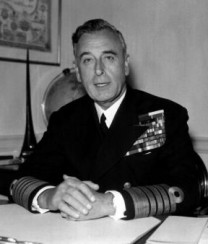 0
0Commons debate on outcome of Mountbatten Enquiry
Follow this link for the commons report following the Mountbatten Enquiry.
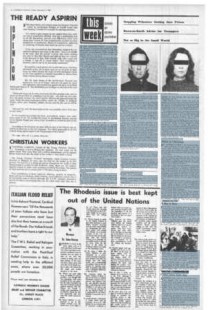 0
0Catholic Herald article on the prison security commission
For the archived article, please follow this link to the Catholic Herald
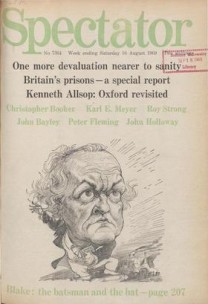 0
0The Spectator – After Mountbatten – a special report
please follow this link to the spectator archive for the full article.
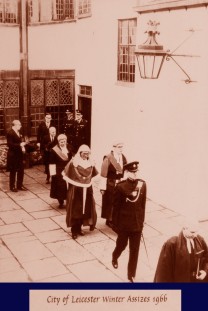 0
0City Of Leicester Winter Assizes 1966
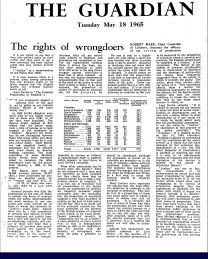 0
0The Rights Of Wrongdoers
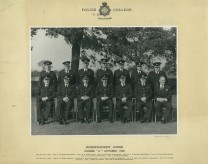 0
0Police College
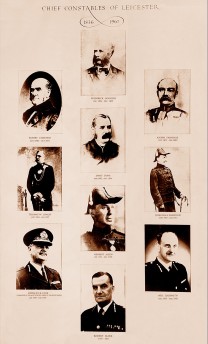 0
0Chief Constables of Leicester
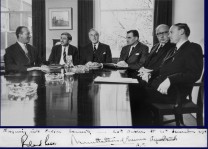 0
0Enquiry Into Prison Security
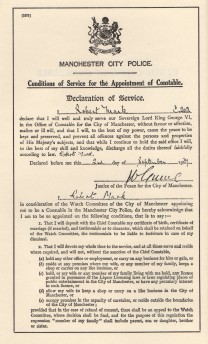 0
0Conditions Of Service